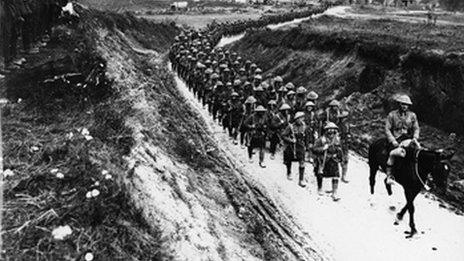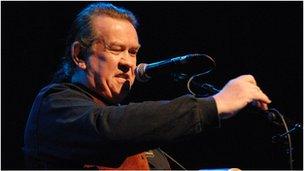Far far from Ypres: Soldiers' songs shine light on WW1 attitudes
- Published

The songs of World War 1 often speak of disillusionment, bitterness, boredom and a very dark sense of humour, says Scottish folk singer and producer Ian McCalman.
He says there was no talk of heroics in the songs the soldiers were singing in the trenches or in the music halls back in Blighty.
"Another surprise was that there were very few songs with any animosity towards the Germans, who they were fighting," says McCalman.
"It was quite unbelievable that the wrath of the soldiers was directed at their own Command."
Last week, England's education secretary Michael Gove sparked a heated debate when he hit out at "left-wing academics" and TV comedies and dramas which had led people to view the conflict as a "misbegotten shambles - a series of catastrophic mistakes perpetrated by an out-of-touch elite".

The show was written and directed by Ian McCalman
McCalman, whose show Far Far From Ypres will be performed at Celtic Connections later, says the theme of disillusionment with their situation and their commanders carries through all the songs, the poetry and the letters of the time.
One song - Hanging on the Old Barbed Wire - asks why various army members are not to be found in the combat zone or anywhere near the trenches.
The popular song has the quarter-master "miles and miles behind the line", the Sergeant-major is "stealing the privates' rum" and the Commissioned Officer is "down in a deep dug-out".
The final line of the song asks, where are the "old battalion"? It answers poignantly: "They're hanging on the old barbed wire."
It is a simple song, says McCalman, but one of the saddest in the show.
Far Far From Ypres began life as an album of songs and poems from WW1, which were recorded by Scottish folk singers.

Barbara Dickson is one of the 28 singers taking part
McCalman, who says he is "not very proud" to admit that he knew very little about World War One or its songs before he began the project, was then inspired to write a narrative around the songs.
It tells the story of Jimmy MacDonald who "comes from any village, town or city" in Scotland.
Everyman Jimmy is full of enthusiasm and joins up as soon as he can, as so many did.
Jimmy gets his basic training on Salisbury Plain before heading off to the trenches of Flanders field.
The show, which is narrated by broadcaster Iain Anderson, features 28 of the finest singers from the Celtic Connections family, such as Barbara Dickson and Dick Gaughan.
It will play out at Glasgow's Royal Concert Hall against a backdrop of images from the war.
It was such a success when first performed in 2012 that it has been brought back to the festival to mark 100 years since the start of the "war to end all wars".

Dick Gaughan is one of those taking part
McCalman says the show is a labour of love for the performers, whom he jokes are "appearing for World War One wages".
The songs, simple as many of them are, give a vivid insight into the attitudes and concerns of the troops in the trenches, he says.
"They survived on bitter humour. They just had to grin and bear it.
"The simplest song of the whole lot was called 'We are here because we're here'."
This song just repeats its title over and over, betraying the trapped, futility of their situation.
"There was nothing else, there were no other words that they could say. They were stuck there," McCalman says.
Another song shows a surprising amount of solidarity with the German soldiers in the opposing trenches.
'Keep your head down Fritzie boy' has British troops in the trenches "up to their eyes in clay" when they spy a German "sticking up his snout".
Remarkably the Tommies shout at their enemy, warning him he is going to get shot if he is not careful.
Other songs such as Gassed last night bemoan the shortage of equipment, in this case respirators to survive the chemical gas attacks.
The bitterness and disillusionment in the songs continues for those who survive the war.
"I wore a tunic, a dirty khaki tunic" is about the perception that people who had not gone to the war had done much better by it.
It contains the line "You were with the wenches/While we were in the trenches/Facing an angry foe".
McCalman says despite the bitter tone of the songs they leave him, the singers and the audience with nothing but admiration for the sacrifices of the thousands of Scots who went to war.
He says: "If I had been there I would have been shot in the back by the Sergeant major because I would have been the first to run.
"So there is an element of hypocrisy in my admiration because I could never be as brave as they were."
- Published5 January 2014